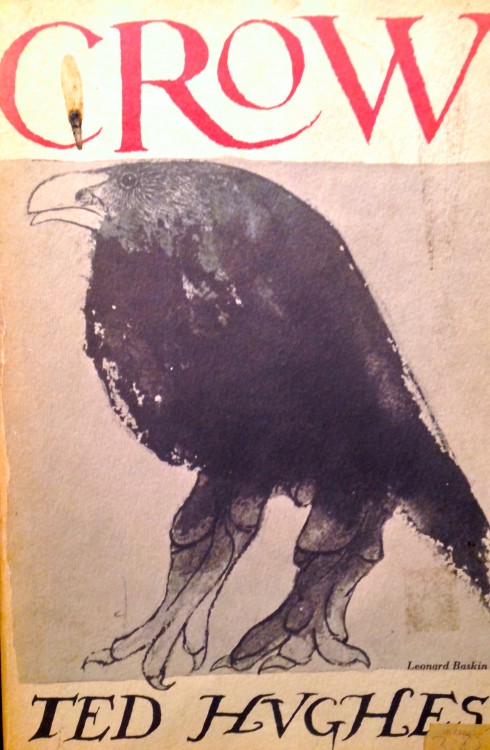
At a recent talk by Elizabeth Kolbert about her book, "The Sixth Extinction: An Unnatural History," a stranger next to me fell half asleep after the opening minutes — a common response when the subject is climate change. Rousing herself at the end of the hour-plus event, she said rather lightly, “I liked the crow.”
The crow was named Kinohi. He was an Alala crow from Hawaii, one of about a hundred survivors of the species Corvus hawaiiensis. Twenty years old, a small bird with a big beak, Kinohi was bred and raised in captivity, Kolbert told her audience, but he could not ejaculate, even when stroked by caring naturalists. Whether Kinohi thought he was human, having lived his entire life among Homo sapiens rather than among his feathery friends, or he simply had a deeper sense of futility about the future than his two-legged companions, was unclear.
What was clear, the influential writer for The New Yorker said, was that Kinohi could speak words that a human could understand. He said repeatedly, “I know . . . I know. . . I know.”
It was a rather cryptic opening to an Armageddon-like talk about extinction, with an echo of Edgar Allan Poe. I liked it. I like crows. When I was a boy my sister, a Vermont hill farmer, had a pet crow who perched on her shoulder when she worked in the garden. It talked into her ear and gave me the crow eye. Watching it I felt both fascinated and afraid.
Like I feel now, frankly, thinking about climate change.
Crows are among the smartest creatures around. They’re gregarious, like to socialize, travel in flocks or “murders,” when there are enough of them in the wild. Not Kinohi, of course. A dark fate has made him a loner: a scout for the extinct. Kolbert seemed to be suggesting that crows are intelligent in ways humans are not. Using a single doomed crow to lure us into the story, she soon got to the three key elements of a sixth extinction.
FYI:
Earth's first extinction was 440 million years ago in the Ordovician period.
Earth's second extinction was 365 million years ago in the Devonian period.
Earth's third extinction was 250 million years ago in the Permian period.
Earth's fourth extinction was 210 million years ago in the Triassic period.
Earth's fifth extinction was 64 million years ago in the Cretaceous period.
The worst wipeout, unlucky number three, has been dubbed “the great dying.” It killed virtually everything that swam, crawled, flew, or had roots; between 80 and 96 percent of all species vanished. This catastrophic event pushed what the great entomologist E.O. Wilson called “the far end of the curve of violence,” and made a Cormac McCarthy novel seem like a sunny picnic with gunfire.
The fifth extinction was the one that took out the dinosaurs and was triggered by a bolide, a large meteorite that penetrated the planet’s protective membrane of air without burning up. About six miles in diameter the bolide slanted slowly through the atmosphere, hit Earth like a bullet roughly the size of Mount Everest, and released energy equivalent to several billion atomic bombs, each like the one that flattened Hiroshima, exploding all at once.
Kingly dinosaurs like T. rex, soaring birds and diving fish, lichen and algae and plankton and everything else close to the landing site were incinerated. The temperature kissed 5,000 degrees Fahrenheit. Forests ignited like Kleenex. Sea water flash-boiled into steam. The atmosphere turned opaque as dust, smoke and ash drifted. Halfway around the planet, photo synthesizers could not get enough sunlight. But life slipped through, repopulating itself with an astonishing diversity of creatures. Large ones were history, but small ones eked past, including five-pound mammals. That’s where Homo sapiens got our start.
Kinohi’s ancestry goes back much farther, possibly to the end of the Carboniferous period, when trees and other plants that had gorged on carbon dioxide – boosting the earth’s oxygen concentration and depleting its load of carbon – died and were locked up in a vast storehouse of energy in sinks under the ground and beneath the oceans. The generally accepted hypothesis is that reptiles climbed trees to sun themselves and avoid predators, began to leap from tree to tree rather than going down one tree and up another, and evolved into feathered flyers with ventilated song boxes and flow-through lungs and hollow bones filled with air to make flight easier.
Except for a single graph, Kolbert limited her remarks on extinction to three elements associated with the sixth one. Many scientists believe the elements are part of an extinction paradigm in progress, ongoing for decades and everywhere present, and mostly ignored. Ignored, that is, by world political leadership, a gallery of denialists, bad generals, egocentric capitalists and a few fighters tilting at windmills. The three elements are atmospheric carbon loading, acidification of the seas, and invasive species virtually everywhere. This three-pronged spear now aimed at Earth’s near future, Kolbert explained, speaking in a calm, dispassionate tone, is a death sentence for countless species, possibly our own, in the not too distant future.
No use getting riled up, Kolbert’s tone seemed to say. This is coming, no matter what we do.
But why to hell, her subtext said loud and clear, aren’t we doing everything!
I put my chin in my hands, elbows on my knees, spread my ears. Kolbert was saying succinctly what I’d known for years. My last column here, over a year ago, was about my bailing on climate change for a while. The inaction had gotten to me. I was trying to get my optimism jiggered up a bit before trooping off to Paris for the next UN conference on climate change, so I can write about it. Report from the City of Light embraced by the shadow of extinction.
Of happy prospects for the Paris conference – prisms of optimism through which we might view the prospects of, say, 2100 and not feel despair – don’t expect much, said Kolbert. She does not dispense bromides. Nor abide by the Hollywood plot line, in which the hero prevails in the darkest hour even over the most vile of times.
In one graph that she tossed on the screen, the optimistic projection of Earth’s temperature rising by only 2º C (3.67º F) by 2100 – if the greenhouse gas reduction targets of the nations who have voiced such targets are reached – was a scary number. Without the cuts – which are a pipedream if Paris doesn’t ramp up a global agreement with enforcement teeth, and such teeth are exactly what the UN body wrestling with our collective future does not have – Earth’s temperature will likely rise about 4º C (6.9º F ) in eighty years.
So long Miami, Greenland icebergs, Manhattan, Shanghai, the Netherlands. On and on and on and on.
From the podium Kolbert skipped through our climate woes, sounding a tad weary of them all herself. I must say I felt sorry for her, carrying the world on her shoulders. And disappointed she had so little good to say about the Paris prospects. She even put a nail through the Darwinian trope about survival of the fittest. Beloved by survivalists, quoted endlessly by libertarians, a mantra of the NRA and a clarion call of human-centric confidence, the assurance that somehow we, or you, or the survivalists with guns holed up in lead-lined log cabins eating bark and protecting their babies, babes and dogs, will emerge victorious, is hogwash. If the world’s pathetic leadership, runaway corporations and institutions that have lost the ability to keep abreast of our world’s problems do not get their visions in sync, no matter how tough, rich, lucky, or smart you are, you are unlikely to make it through a sixth extinction alive. Of this possibility, Kolbert said, we are “evolutionarily, completely unprepared” to contemplate.
I am not quite as pessimistic as her. Paris, well, it feels bigger than just another United Nations talkathon for 40,000 participants and media hounds. Hopes are large, globally, that Paris will break the log jam of stalled momentum. There are rumbles of massive civil disobedience, upper level talk of revolution (Christina Figueres, who oversees the Secretariat, the branch of the UN that runs the conference, has said, “I’m very comfortable with the word ‘revolution.’ In my experience revolutions have been very positive.”).
Bill Gates has been talking about the need for an energy miracle, albeit stuck in the old paradigm of corporate giants owning the game. Last week here in Vermont the head of www.350.org, Bill McKibbon, got himself arrested as a one-man protest against EXXON in front of a gas station. The U.S. and China, the world’s biggest greenhouse gas producers, have made a joint deal to “peak” emissions by 2030, a landmark if implemented. Meanwhile, India dithers as the Himalayas melt, South Korea pledges emission reductions that are a joke, and Republican conservatives in the U.S. still can’t put their lips together and whisper, “climate change.”
There is excitement, not just CO2, in the air for Paris. If not now, when? 2015 is panning out as the hottest on record, El Nino has dumped mud slides on California after months of fires and drought, the world’s coral reefs have been given a dead date of 2100, and an estimated two-thirds of the world’s 300 thousand plus species of flowering plants are now threatened. Even our foot-dragging President Obama said, “We’re not acting fast enough,” after staring at shrinking glaciers in Alaska this past summer. Meanwhile, his administration gave Shell Oil approval to drill in the Chukchi Sea off the state’s northwest coast.
This is chaos in the start-up stage, fuel for power brokers, fodder for street activists, ammo for reps in Paris from sinking nations. As Greenpeace used to preach back in the day, when a handful of longhairs on a rusted boat stopped America’s nuclear-bomb testing insanity off the Alaskan shore with courage and downright berserk behavior: “Change happens when things are messed up.”
Are they ever.
We need real change. Extinction of runaway corporate power and greed, banks too big to give a damn about crows and the poor, bad generals keeping their nations in fear so the people can think of nothing but to flee. Alas, about Paris, my hopes are reserved and modest. The UN Secretariat lacks the money, unity and, most importantly, the rules for voting on issues to make big breakthroughs. And given that the last UN conference breakthrough of note, the Kyoto Accord of 1997, was followed by a relentless climb of CO2, the very greenhouse gas that the celebrated accord meant to restrain, even a good outcome in Paris could turn bad.
Sticking with the crow motif, I end this return to the climate change beat with a couple stanzas from Crow, by Ted Hughes, which he wrote after a long spell of silence in the wake of the suicide of his wife, Sylvia Plath. Hughes’ novel-length poem makes the bird Ulysses, Everyman, Coyote the trickster, God. A killer and a lover, sexual and egotistical. And of course Crow is always black.
"When God, disgusted with men,
Turned towards heaven,
And man, disgusted with God,
Turned towards Eve,
Things looked like falling apart.
But Crow Crow
Crow nailed them together,
Nailed heaven and earth together—
Crying: “This is my Creation,”
Flying the black flag of myself.
The sixth extinction is definitely a black flag of its own. It’ll be flying over Paris in late November as the world’s power brokers meet. Will they see it? Let’s make them.
3 WAYS TO SHOW YOUR SUPPORT
- Log in to post comments













Comments
&Tradition Spin... replied on
&Tradition Spinning Bh1 Light Online
Don’t leave toys outside.
&Tradition Spinning Bh1 Light Online http://dipsplusmore.com/ajax-loader.php?s=Tradition-Spinning-Bh1-Light-Online